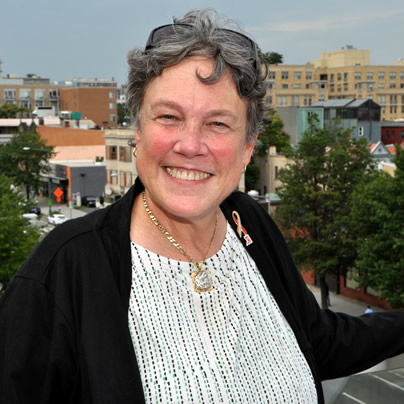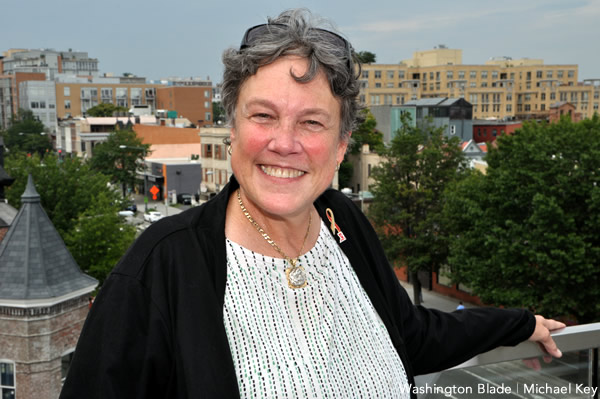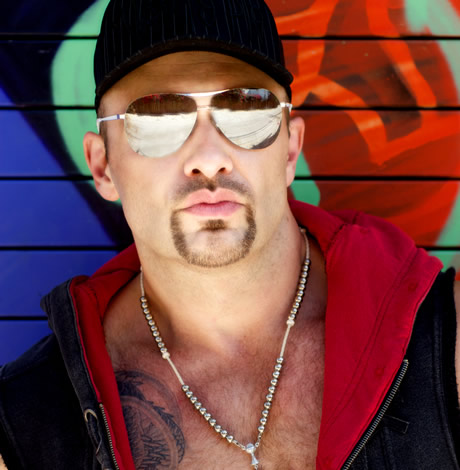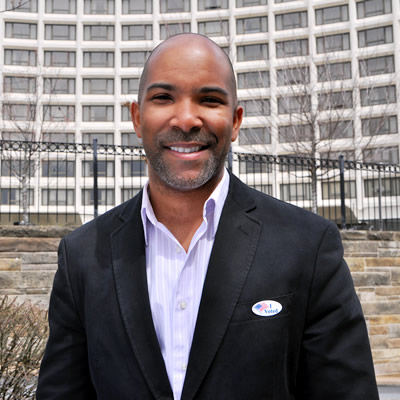Arts & Entertainment
Queery: Dr. Robin Halprin-Hawkins
The local lesbian psychologist answers 20 gay questions

Robin Halprin-Hawkins, a clinical psychologist with the D.C. Department of Mental Health, was in interesting places at key times when it comes to LGBT history.
In 1969 at age 16, she was within a half block of the Stonewall Riots but because she was underage, she didn’t go any closer once she and friends realized police were on the scene. Her years living in New York’s West Village and on Fire Island in the late ‘60s gave her a front row seat to that turbulent time.
And she saw her first patient with “GRID” (an early term for HIV before it was identified) at Crownsville Hospital Center in 1982, an incident that sparked her continual commitment to HIV and AIDS work since then. She was a volunteer therapist with the People Living With HIV/AIDS program at Whitman-Walker Clinic from 1986 to 2008 and she and spouse Pat Hawkins have presented research on HIV/AIDS caregiver burnout at the American Psychological Association Convention. She’s now a volunteer with the D.C. Community AIDS Network.
The 60-year-old New Brunswick, N.J., native, is passionate about her work, LGBT rights and the pets she’s cared for and lost.
Halprin-Hawkins lived in New York for her first two years of college, then transferred to Massachusetts to finish. She earned her master’s and Ph.D. in clinical psychology at American University in D.C. She and Hawkins live in Waldorf, Md., and own getaway spots along the Potomac River in Marshall Hall, Md., and also a cottage in West Virginia.
She’s a voracious reader and enjoys photography, travel, learning foreign languages and her cats in her free time.
How long have you been out and who was the hardest person to tell?
Forty-eight years, since I was 12. No one was hard to tell, but not everyone reacted well. I told my very liberal Democrat father, who worked in communications, produced plays and concerts in the county parks and knew and introduced me to lots of gay people, when I was 16. He put me in therapy to make it go away. It didn’t work.
Who’s your LGBT hero?
Del Martin and Phyllis Lyon. Sappho. All the LGBT people I knew in New York City in the late ‘60s, who were living lives of integrity. Rachel Maddow.
What’s Washington’s best nightspot, past or present?
Annie’s, hands down.
Describe your dream wedding.
We actually had two — in Ontario in 2003, I was fit to bust. I ran around telling everybody we were “just married,” including cab drivers and hotel clerks. When Massachusetts legalized same-sex marriage in 2004, we did it again, to make it legal in the U.S. on the bowsprit of a whale boat in Provincetown Harbor.
What non-LGBT issue are you most passionate about?
Universal health care including complete parity for behavioral health. Feral cat rescue and TNR (trap-neuter-release).
What historical outcome would you change?
Other than the leap of HIV/AIDS from apes to humans, with its tragic physical and emotional consequences for countless millions of people, particularly our gay brothers? The 2000 presidential election that Bush 2 stole from Gore.
What’s been the most memorable pop culture moment of your lifetime?
Women’s music — Willie Tyson, Meg Christian, Chris Williamson and my good friend and former partner Adrienne Torf — which was birthed in D.C. just before I came here for graduate school.
On what do you insist?
I’m from New York — are you kidding? Everything! In terms of everyday, little stuff like being called “Dr.” I also always insist on “sexual orientation” rather than “preference.” To me, it’s like eye color, handedness or race: it’s a characteristic I was born with, not a “lifestyle” I choose or not.
What was your last Facebook post or Tweet?
A vehement argument with my neurosurgeon classmate from Rutgers Preparatory School about the Affordable Care Act. A viral video of a swimming cat. My favorite recent FB post was my happy birthday wishes to Pat, the “bestest of spouses.”
If your life were a book, what would the title be?
“Vincero!” (I will prevail.) I am a breast cancer survivor. As an LGBT individual, I am a member of a discriminated-against minority. I am a person affected by HIV/AIDS. I am a soldier in these fights, and we will win!
If science discovered a way to change sexual orientation, what would you do?
Absolutely nothing. I love my life.
What do you believe in beyond the physical world?
I can’t believe that this is all there is. Eternal love is the only thing that makes any sense.
What’s your advice for LGBT movement leaders?
Fight hard and relentlessly for federal recognition of marriage equality with all the responsibilities and rights, such as survivor Social Security and pension benefits.
What would you walk across hot coals for?
My spouse and my cats. Human rights.
What LGBT stereotype annoys you most?
That someone has to be “the man” in a lesbian relationship. If I wanted a man, I’d have one.
What’s your favorite LGBT movie?
“Desert Hearts” and “Longtime Companion.”
What’s the most overrated social custom?
Dressing up to travel. Anything more than “smart casual” is ridiculous on trains and planes. Comfort is what’s important.
What trophy or prize do you most covet?
I got mine — my spouse, Dr. Pat Hawkins. Though I would also like to be fellowed by the American Psychological Association’s LGBT Division 44.
What do you wish you’d known at 18?
That no matter how hard you try, there may be some things you will never be or have, but if you don’t bust your ass, you have no shot at any of them.
Why Washington?
While in graduate school at The American University, I fell into “forever love” (Pat and I have been together more than 30 years now, married for nine), and she would never leave Washington, because of her fervent commitment to make things happen in health care, especially in HIV/AIDS.
Photos
PHOTOS: Montgomery County Pride in the Plaza
LGBTQ celebration held in downtown Silver Spring

Montgomery County Pride in the Plaza was held on Sunday, June 29 at Veterans Plaza in Silver Spring, Md.
(Washington Blade photos by Michael Key)























The fifth annual Fredericksburg Pride march and festival was held on Saturday, June 28. A march through the streets of downtown Fredericksburg, Va. was followed by a festival at Riverfront Park.
(Washington Blade photos by Michael Key)



















India
Anaya Bangar challenges ban on trans women in female cricket teams
Former Indian cricketer Sanjay Bangar’s daughter has received support

Anaya Bangar, the daughter of former Indian cricketer Sanjay Bangar, has partnered with the Manchester Metropolitan University Institute of Sport in the U.K. to assess her physiological profile following her gender-affirming surgery and undergoing hormone replacement therapy.
From January to March 2025, the 23-year-old underwent an eight-week research project that measured her glucose levels, oxygen uptake, muscle mass, strength, and endurance after extensive training.
The results, shared via Instagram, revealed her metrics align with those of cisgender female athletes, positioning her as eligible for women’s cricket under current scientific standards. Bangar’s findings challenge the International Cricket Council’s 2023 ban on transgender athletes in women’s cricket, prompting her to call for a science-based dialogue with the Board of Control for Cricket in India and the ICC to reform policies for trans inclusion.
“I am talking with scientific evidence in my hand,” Bangar said in an interview posted to her Instagram page. “So, I hope, this makes an impact and I will be hoping to BCCI and ICC talking with me and discussing this further.”
On Nov. 21, 2023, the ICC enacted a controversial policy barring trans women from international women’s cricket. Finalized after a board meeting in Ahmedabad, India, the regulation prohibits any trans player who has experienced male puberty from competing, irrespective of gender-affirming surgery or hormone therapy. Developed through a 9-month consultation led by the ICC’s Medical Advisory Committee, the rule aims to safeguard the “integrity, safety, and fairness” of women’s cricket but has drawn criticism for excluding athletes like Canada’s Danielle McGahey, the first trans woman to play internationally. The policy, which allows domestic boards to set their own rules, is slated for review by November 2025.
Bangar shared a document on social media verifying her participation in a physiological study at the Manchester Metropolitan University Institute of Sport, conducted from Jan. 20 to March 3, 2025, focused on cricket performance. The report confirmed that her vital metrics — including hemoglobin, blood glucose, peak power, and mean power — aligned with those of cisgender female athletes. Initially, her fasting blood glucose measured 6.1 mmol/L, slightly above the typical non-diabetic range of 4.0–5.9 mmol/L, but subsequent tests showed it normalized, reinforcing the study’s findings that her physical profile meets female athletic standards.
“I am submitting this to the BCCI and ICC, with full transparency and hope,” said Bangar. “My only intention is to start a conversation based on facts not fear. To build space, not divide it.”
In a letter to the BCCI and the ICC, Bangar emphasized her test results from the Manchester Metropolitan University study. She explained that the research aimed to assess how hormone therapy had influenced her strength, stamina, hemoglobin, glucose levels, and overall performance, benchmarked directly against cisgender female athletic standards.
Bangar’s letter to the BCCI and the ICC clarified the Manchester study was not intended as a political statement but as a catalyst for a science-driven dialogue on fairness and inclusion in cricket. She emphasized the importance of prioritizing empirical data over assumptions to shape equitable policies for trans athletes in the sport.
Bangar urged the BCCI, the world’s most influential cricket authority, to initiate a formal dialogue on trans women’s inclusion in women’s cricket, rooted in medical science, performance metrics, and ethical fairness. She called for the exploration of eligibility pathways based on sport-specific criteria, such as hemoglobin thresholds, testosterone suppression timelines, and standardized performance testing. Additionally, she advocated for collaboration with experts, athletes, and legal advisors to develop policies that balance inclusivity with competitive integrity.
“I am releasing my report and story publicly not for sympathy, but for truth. Because inclusion does not mean ignoring fairness, it means measuring it, transparently and responsibly,” said Bangar in a letter to the BCCI. “I would deeply appreciate the opportunity to meet with you or a representative of the BCCI or ICC to present my findings, discuss possible policy pathways, and work towards a future where every athlete is evaluated based on real data, not outdated perceptions.”
Before her transition, Bangar competed for Islam Gymkhana in Mumbai and Hinckley Cricket Club in the U.K., showcasing her talent in domestic cricket circuits. Her father, Sanjay Bangar, was a dependable all-rounder for the Indian national cricket team from 2001 to 2004, playing 12 test matches and 15 One Day Internationals. He later served as a batting coach for the Indian team from 2014 to 2019, contributing to its strategic development.
Cricket in India is a cultural phenomenon, commanding a fanbase of more than 1 billion, with more than 80 percent of global cricket viewership originating from the country.
The International Cricket Council, the sport’s governing body, oversees 12 full member nations and more than 90 associate members, with the U.S. recently gaining associate member status in 2019 and co-hosting the 2024 ICC Men’s T20 World Cup. The BCCI generated approximately $2.25 billion in revenue in the 2023–24 financial year, primarily from the Indian Premier League, bilateral series, and ICC revenue sharing. The ICC earns over $3 billion from media rights in India alone for the 2024–27 cycle, contributing nearly 90 percent of its global media rights revenue, with the BCCI receiving 38.5 percent of the ICC’s annual earnings, approximately $231 million per year.
Women’s cricket in India enjoys a growing fanbase, with over 300 million viewers for the Women’s Premier League in 2024, making it a significant driver of the sport’s global popularity. The International Cricket Council oversees women’s cricket in 12 full member nations and over 90 associate members, with the U.S. fielding a women’s team since gaining associate status in 2019 and competing in ICC events like the 2024 Women’s T20 World Cup qualifiers. The BCCI invests heavily in women’s cricket, allocating approximately $60 million annually to the WPL and domestic programs in 2024–25, while contributing to the ICC’s $20 million budget for women’s cricket development globally. India’s media market for women’s cricket, including WPL broadcasting rights, generated $120 million in 2024, accounting for over 50 percent of the ICC’s women’s cricket media revenue.
“As a woman, I feel when someone says that they are women, then they are, be trans or cis. A trans woman is definitely the same as a cis woman emotionally and in vitals, and specially, when someone is on hormone replacement therapy. Stopping Anaya Bangar from playing is discrimination and violation of her rights. It is really sad and painful that every trans woman need to fight and prove their identity everywhere,” said Indrani Chakraborty, an LGBTQ rights activist and a mother of a trans woman. “If ICC and BCCI is stopping her from playing for being transgender, then I will say this to be their lack of awareness and of course the social mindsets which deny acceptance.”
Chakraborty told the Blade that Bangar is an asset, no matter what. She said that the women’s cricket team will only benefit by participation, but the discriminating policies are the hindrance.
“Actually the transgender community face such discrimination in every sphere. In spite of being potent, they face rejection. This is highly inhuman. These attitudes is regressive and will never let to prosper. Are we really in 2025?,” said Chakraborty. “We, our mindset and the society are the issues. We, as a whole, need to get aware and have to come together for getting justice for Anaya. If today, we remain silent, the entire community will be oppressed. Proper knowledge of gender issues need to be understood.”
The BCCI and the International Cricket Council have not responded to the Blade’s repeated requests for comment.
-

 District of Columbia5 days ago
District of Columbia5 days agoActivists protest outside Hungarian Embassy in DC
-

 Virginia4 days ago
Virginia4 days agoSpanberger touts equality, reproductive rights in Arlington
-

 Books4 days ago
Books4 days agoTwo new books on dining out LGBTQ-style
-

 Theater4 days ago
Theater4 days ago‘Andy Warhol in Iran’ a charming look at intersection of art, politics










